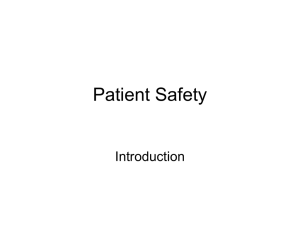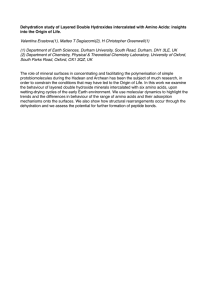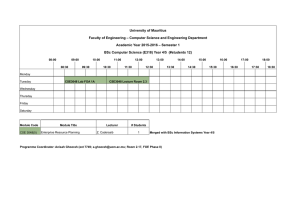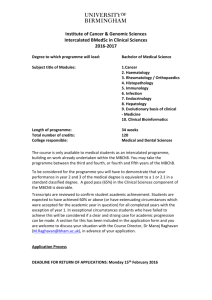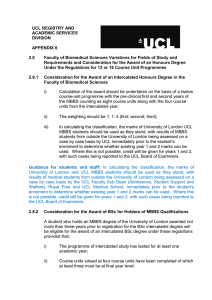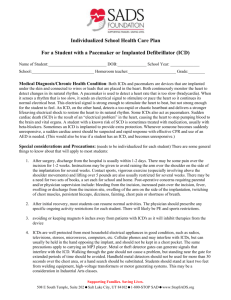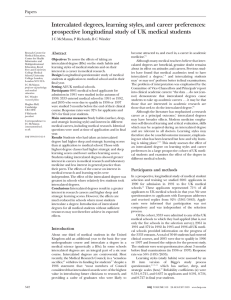Doctors love qualifications, often listing and expectations, although that is little
advertisement
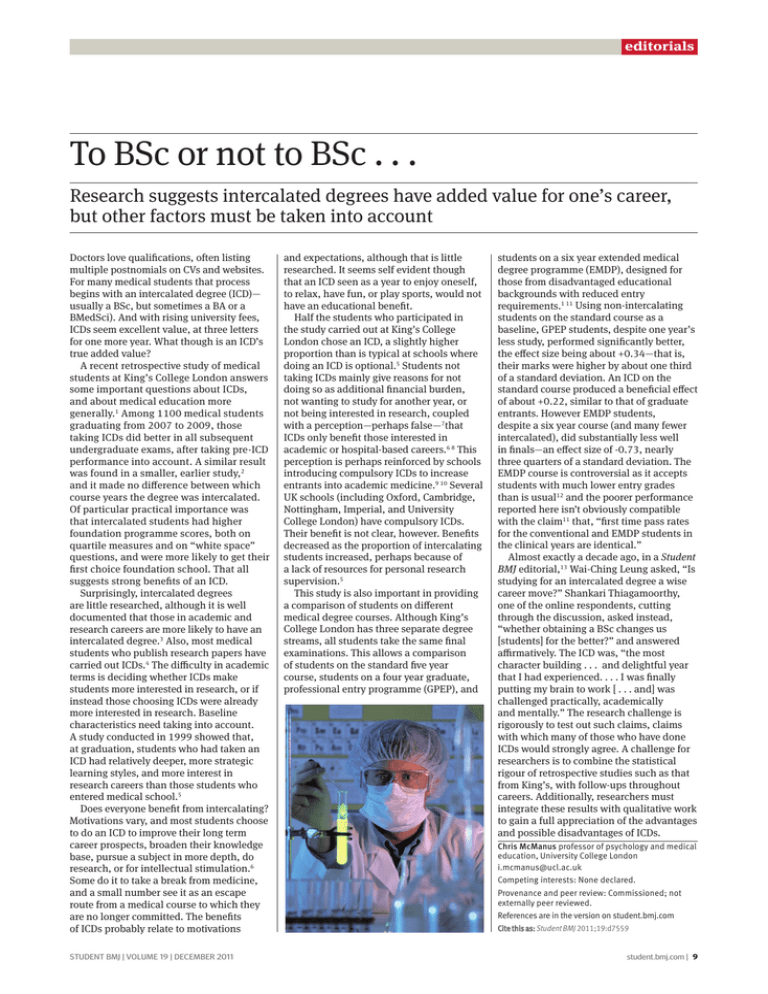
editorials To BSc or not to BSc . . . Research suggests intercalated degrees have added value for one’s career, but other factors must be taken into account Doctors love qualifications, often listing multiple postnomials on CVs and websites. For many medical students that process begins with an intercalated degree (ICD)— usually a BSc, but sometimes a BA or a BMedSci). And with rising university fees, ICDs seem excellent value, at three letters for one more year. What though is an ICD’s true added value? A recent retrospective study of medical students at King’s College London answers some important questions about ICDs, and about medical education more generally.1 Among 1100 medical students graduating from 2007 to 2009, those taking ICDs did better in all subsequent undergraduate exams, after taking pre-ICD performance into account. A similar result was found in a smaller, earlier study,2 and it made no difference between which course years the degree was intercalated. Of particular practical importance was that intercalated students had higher foundation programme scores, both on quartile measures and on “white space” questions, and were more likely to get their first choice foundation school. That all suggests strong benefits of an ICD. Surprisingly, intercalated degrees are little researched, although it is well documented that those in academic and research careers are more likely to have an intercalated degree.3 Also, most medical students who publish research papers have carried out ICDs.4 The difficulty in academic terms is deciding whether ICDs make students more interested in research, or if instead those choosing ICDs were already more interested in research. Baseline characteristics need taking into account. A study conducted in 1999 showed that, at graduation, students who had taken an ICD had relatively deeper, more strategic learning styles, and more interest in research careers than those students who entered medical school.5 Does everyone benefit from intercalating? Motivations vary, and most students choose to do an ICD to improve their long term career prospects, broaden their knowledge base, pursue a subject in more depth, do research, or for intellectual stimulation.6 Some do it to take a break from medicine, and a small number see it as an escape route from a medical course to which they are no longer committed. The benefits of ICDs probably relate to motivations student bmj | volume 19 | December 2011 and expectations, although that is little researched. It seems self evident though that an ICD seen as a year to enjoy oneself, to relax, have fun, or play sports, would not have an educational benefit. Half the students who participated in the study carried out at King’s College London chose an ICD, a slightly higher proportion than is typical at schools where doing an ICD is optional.5 Students not taking ICDs mainly give reasons for not doing so as additional financial burden, not wanting to study for another year, or not being interested in research, coupled with a perception—perhaps false—7that ICDs only benefit those interested in academic or hospital-based careers.6 8 This perception is perhaps reinforced by schools introducing compulsory ICDs to increase entrants into academic medicine.9 10 Several UK schools (including Oxford, Cambridge, Nottingham, Imperial, and University College London) have compulsory ICDs. Their benefit is not clear, however. Benefits decreased as the proportion of intercalating students increased, perhaps because of a lack of resources for personal research supervision.5 This study is also important in providing a comparison of students on different medical degree courses. Although King’s College London has three separate degree streams, all students take the same final examinations. This allows a comparison of students on the standard five year course, students on a four year graduate, professional entry programme (GPEP), and students on a six year extended medical degree programme (EMDP), designed for those from disadvantaged educational backgrounds with reduced entry requirements.1 11 Using non-intercalating students on the standard course as a baseline, GPEP students, despite one year’s less study, performed significantly better, the effect size being about +0.34—that is, their marks were higher by about one third of a standard deviation. An ICD on the standard course produced a beneficial effect of about +0.22, similar to that of graduate entrants. However EMDP students, despite a six year course (and many fewer intercalated), did substantially less well in finals—an effect size of -0.73, nearly three quarters of a standard deviation. The EMDP course is controversial as it accepts students with much lower entry grades than is usual12 and the poorer performance reported here isn’t obviously compatible with the claim11 that, “first time pass rates for the conventional and EMDP students in the clinical years are identical.” Almost exactly a decade ago, in a Student BMJ editorial,13 Wai-Ching Leung asked, “Is studying for an intercalated degree a wise career move?” Shankari Thiagamoorthy, one of the online respondents, cutting through the discussion, asked instead, “whether obtaining a BSc changes us [students] for the better?” and answered affirmatively. The ICD was, “the most character building . . . and delightful year that I had experienced. . . . I was finally putting my brain to work [ . . . and] was challenged practically, academically and mentally.” The research challenge is rigorously to test out such claims, claims with which many of those who have done ICDs would strongly agree. A challenge for researchers is to combine the statistical rigour of retrospective studies such as that from King’s, with follow-ups throughout careers. Additionally, researchers must integrate these results with qualitative work to gain a full appreciation of the advantages and possible disadvantages of ICDs. Chris McManus professor of psychology and medical education, University College London i.mcmanus@ucl.ac.uk Competing interests: None declared. Provenance and peer review: Commissioned; not externally peer reviewed. References are in the version on student.bmj.com Cite this as: Student BMJ 2011;19:d7559 student.bmj.com | 9 Student BMJ: To BSc or not to BSc . . . 2 of 3 http://student.bmj.com/student/view-article.html?id=sbmj.d7559 of resources for personal research supervision.[5] This study is also important in providing a comparison of students on different medical degree courses. Although King’s College London has three separate degree streams, all students take the same final examinations. This allows a comparison of students on the standard five year course, students on a four year graduate, professional entry programme (GPEP), and students on a six year extended medical degree programme (EMDP), designed for those from disadvantaged educational backgrounds with reduced entry requirements.[1] [11] Using non-intercalating students on the standard course as a baseline, GPEP students, despite one year’s less study, performed significantly better, the effect size being about +0.34—that is, their marks were higher by about one third of a standard deviation. An ICD on the standard course produced a beneficial effect of about +0.22, similar to that of graduate entrants. However EMDP students, despite a six year course (and many fewer intercalated), did substantially less well in finals—an effect size of -0.73, nearly three quarters of a standard deviation. The EMDP course is controversial as it accepts students with much lower entry grades than is usual[12] and the poorer performance reported here isn’t obviously compatible with the claim[11] that, “first time pass rates for the conventional and EMDP students in the clinical years are identical.” Almost exactly a decade ago, in a Student BMJ editorial,[13] Wai-Ching Leung asked, “Is studying for an intercalated degree a wise career move?” Shankari Thiagamoorthy, one of the online respondents, cutting through the discussion, asked instead, “whether obtaining a BSc changes us [students] for the better?” and answered affirmatively. The ICD was, “the most character building . . . and delightful year that I had experienced. . . . I was finally putting my brain to work [ . . . and] was challenged practically, academically and mentally.” The research challenge is rigorously to test out such claims, claims with which many of those who have done ICDs would strongly agree. A challenge for researchers is to combine the statistical rigour of retrospective studies such as that from King’s, with follow-ups throughout careers. Additionally, researchers must integrate these results with qualitative work to gain a full appreciation of the advantages and possible disadvantages of ICDs. Chris McManus, professor of psychology and medical education 1 University College London Correspondence to: Competing interests: None declared. Provenance and peer review: Commissioned; not externally peer reviewed. References 1. Mahesan N, Crichton S, Sewell H, Howell S. The effect of an intercalated BSc on subsequent academic performance. BMC Medical Education 2011;11:76 www.biomedcentral.com/1472-6920/11/76. 2. Cleland J, Milne A, Sinclair H, Lee AJ. An intercalated degree is associated with higher marks in subsesquent medical school examinations. BMC Medical Education 2009;9:24 www.biomedcentral.com/1472-6920/9/24. 3. Evered DC, Anderson J, Griggs P, Wakeford R. The correlates of research success. BMJ 1987;295:241-6. 4. Griffin MF, Hindocha S. Publication practices of medical students at British medical schools: Experience, attitudes and barriers to publish. Medical Teacher 2011;33:e1-e8. 5. McManus IC, Richards P, Winder BC. Intercalated degrees, learning styles, and career preferences: prospective longitudinal study of UK medical students. BMJ 1999;319:542-6. 6. Agha R, Howell S. Intercalated BSc degrees—Why do students do them? Clinical Teacher 2005;2:72-6. 7. Jones M, Singh S, Lloyd M. “It isn’t just consultants that need a BSc”: student experiences of an intercalated BSc in Primary Health Care. Medical Teacher 2005;27:164-8. 8. Nicholson JA, Cleland J, Lemon J, Galley HF. Why medical students choose not to carry out an intercalated BSc: a questionnaire study. BMC Medical Education 2010;10:25 www.biomedcentral.com/1472-6920/10/25. 9. Morrison J. Academic medicine and intercalated degrees. Medical Education 2004;38:1128-9. 10. Collins JP, Farish S, McCalman JS, McColl GJ. A mandatory intercalated degree programme: Revitalising and enhancing academic and evidence-based medicine. Medical Teacher 2010;32:e541-6. 11. Garlick PB, Brown G. Widening participation in medicine. BMJ 2008;336:1111-3. 12. Ip H, McManus IC. Increasing diversity among clinicians. BMJ 2008;336:1082-3. 13. Wai-Ching Leung. Is studying for an intercalated degree a wise career move? Student BMJ 2001;9:399-402. Cite this as: Student BMJ 2011;19:d7559 Responses to this article Go to page: 1 02/12/2011 12:52
